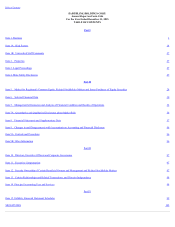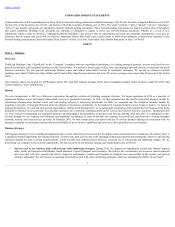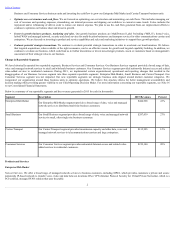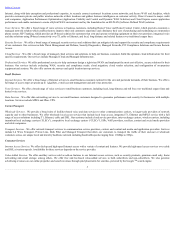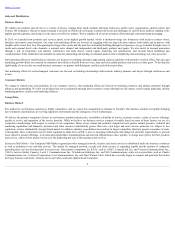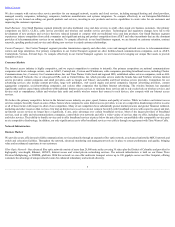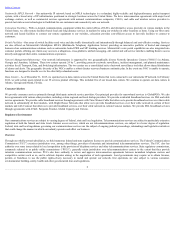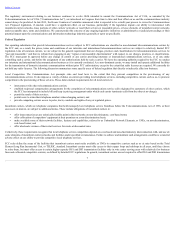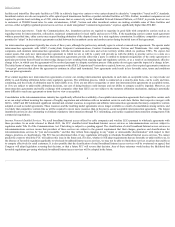Earthlink 2015 Annual Report Download - page 13
Download and view the complete annual report
Please find page 13 of the 2015 Earthlink annual report below. You can navigate through the pages in the report by either clicking on the pages listed below, or by using the keyword search tool below to find specific information within the annual report.
Table of Contents
As a result of the mergers of BellSouth, SBC and AT&T and of MCI and Verizon, the number of providers of competitive access services has diminished. The
FCC and the Department of Justice placed conditions on the AT&T and Verizon mergers to constrain the ability of AT&T and Verizon to raise prices on their
wholesale special access and equivalent retail services, but these regulatory pricing constraints have now expired. AT&T and Verizon are therefore free to realign
charges for special access services with current commercial rates. Because a substantial portion of our services are delivered over special access lines purchased
from AT&T and Verizon, a significant increase in the price for special access could substantially increase our cost of services.
The FCC currently is considering whether and how to reform its special access rules. In 2012, the FCC suspended consideration of new petitions for metropolitan
area pricing flexibility by incumbent carriers, but this decision does not affect previously-approved pricing flexibility. The FCC is in the process of reviewing the
special access market to determine whether it should formulate new pricing rules. We rely to a considerable extent on interstate special access services purchased
from the incumbent carriers in order to connect to our customers. We cannot predict when the FCC will issue a decision regarding special access prices or how any
such decision will affect our business. A significant increase in the price for special access could materially increase our cost of services. Additional pricing
flexibility for special access services offered by the incumbent carriers could place us at a competitive disadvantage, both as a purchaser of access and as a vendor
of access to other carriers or end-user customers.
Certain ILECs have expressed an intention to begin discontinuing DS1 and DS3 special access services or at least certain term plans that provide us with discounts
on these services. Under the FCC’s current rules, this could eliminate our ability to serve certain customers or increase the cost of doing so. However, in August
2015, the FCC adopted a requirement to receive authority to discontinue, reduce, or impair a legacy service that is used as a wholesale input by competitive
providers, an ILEC must commit to providing competitive carriers “reasonably comparable” wholesale access on “reasonably comparable” rates, terms, and
conditions. This requirement expires upon the resolution the FCC’s pending review of the special access market. We cannot predict how the FCC will interpret the
“reasonably comparable” standard or how application of that standard will affect our ability to obtain sufficient wholesale inputs from in the incumbent LECs in
the future.
Universal Service. The Communications Act and the FCC's rules provide for a federal USF, which is intended to subsidize communications services in rural and
high-cost areas, services for low-income consumers, and services for schools, libraries and rural health care providers. Currently, the FCC assesses all providers of
telecommunications services, interconnected VoIP services, and certain providers of telecommunications a percentage of interstate and international revenues
received from U.S. retail customers. We are subject to this contribution requirement. Providers are permitted to pass through their USF contribution assessment to
their customers in a manner consistent with FCC billing regulations. The FCC is considering a number of proposed changes to the method of assessing these USF
contributions, but we cannot predict when it may reach a decision or what types of changes may be adopted.
In December 2012, the FCC adopted an order clarifying its USF contribution rules that adversely affect companies like us that use special access services
purchased from incumbent carriers to provide only broadband Internet access to our customers. The FCC stated that in these cases, the incumbent carrier must pay
a USF contribution on its special access revenues, which these carriers as a matter of course pass through to the special access customer. This in turn increases our
cost of purchasing special access service and using it as an input in providing broadband Internet access services. However, we must compete against broadband
Internet access services provided by incumbent carriers and cable television companies, among others, which are not subject to USF contribution requirements and
therefore do not incur this added cost. Several companies have petitioned for FCC reconsideration of this decision, but we cannot predict whether these petitions
will be successful or when they may be decided.
In November 2011, the FCC adopted extensive revisions to its high-cost support USF program, which largely subsidizes the provision of local telephone service by
incumbent carriers in rural areas. Under the new program, it should be difficult for incumbent carriers to receive subsidies for services provided in competition with
unsubsidized providers like us, although we cannot be certain that this will occur. It is also possible, under certain conditions, for competitive providers like us to
seek subsidies for constructing and operating broadband Internet access facilities in rural areas. However, we cannot predict whether provision of broadband
Internet access services in such rural areas will be economically practicable, even with potential subsidies.
Customer Proprietary Network Information and Privacy. The Communications Act and the FCC's rules require carriers to implement measures to prevent the
unauthorized disclosure of Customer Proprietary Network Information (“CPNI”). CPNI includes information related to the quantity, technological configuration,
type, destination and the amount of use of a telecommunications service or an interconnected VoIP service. CPNI rules include restrictions on telecommunications
carriers and providers of interconnected VoIP service. We must file a verified certification of compliance by March 1 of each year that affirms the existence of
training and other sales and marketing processes designed to prevent improper use and unauthorized release of CPNI. An inadvertent violation of these and related
CPNI requirements by us could subject our company to significant fines or other regulatory penalties.
10


